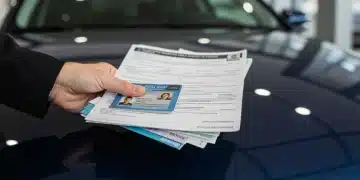Used car buying checklist for beginners: your essential guide

A used car buying checklist for beginners includes gathering essential documents, asking critical questions, inspecting the vehicle thoroughly, and taking a test drive to ensure a reliable purchase.
Are you ready to dive into the world of used car buying? With a solid used car buying checklist for beginners, you can find your ideal vehicle without the stress. Let’s explore what you need to know before hitting the lot.
Understanding your budget and financing options
Understanding your budget is crucial when it comes to buying a used car. Start by determining not just how much you can afford for the car itself, but also the additional expenses, such as insurance, registration, and maintenance. This way, you can set a realistic maximum price.
Next, consider your financing options. Will you be paying cash, or do you plan on taking out a loan? Many dealerships offer financing, but it’s essential to shop around for the best interest rates. Don’t hesitate to check with banks and credit unions as they often provide better deals.
Key Points to Remember About Budgeting
- Set a total budget that includes car price and extra costs.
- Check your credit score to understand your financing potential.
- Consider how much you can comfortably pay each month.
- Factor in future expenses like maintenance and repairs.
When exploring financing, it’s useful to get pre-approved for a loan before visiting dealerships. This not only gives you a better idea of what you can afford, but it also empowers you during negotiations. With pre-approval, you can compare the dealership’s financing offers against the best options you’ve researched, ensuring that you are getting a good deal.
As you navigate through financing, remember that the goal is to find a plan that works for your budget. Always read the fine print in any agreement before signing, as hidden costs can add up quickly. By understanding your budget and exploring all your financing options, you will be well-equipped to make an informed purchase.
Key features to look for in a used car
When shopping for a used car, it is essential to know the key features that can greatly impact your purchase decision. The right features can enhance your driving experience, improve safety, and provide better overall value.
Start by considering the vehicle’s mileage. A car with lower mileage often signifies less wear and tear, which can lead to fewer repairs. However, it’s also crucial to look at the vehicle’s maintenance history. Ensure that previous owners performed regular upkeep, as this speaks to the car’s condition.
Important Features to Examine
- Safety Features: Look for cars equipped with airbags, anti-lock brakes, and electronic stability control.
- Fuel Efficiency: A vehicle with good fuel economy can save you money over time.
- Technological Amenities: Features like Bluetooth connectivity, GPS navigation, and rear-view cameras increase convenience.
- Warranty and Coverage: Check if the car still has a manufacturer’s warranty to provide peace of mind.
Additionally, think about the interior space. If you have a family or travel often with friends, make sure the car offers adequate seating and cargo room. Comfort is key, so try out the seats and ensure they fit your needs. A car’s dependability is also vital; researching the make and model can reveal common issues that may arise.
As you evaluate different cars, pay attention to the test drive. This is your opportunity to feel how the car handles on the road. Note how it accelerates, brakes, and corners. Do not hesitate to express any concerns you have with the seller, as this can lead to valuable insights about the vehicle’s history and reliability.
Essential documents to gather before buying

Before making a used car purchase, gathering the essential documents is a key step that can simplify the buying process. Having everything ready can save time and avoid potential pitfalls during negotiations.
Start by collecting your driver’s license. This document is necessary to test drive the vehicle legally and may be required when completing the sale. Next, prepare your insurance information. If you have a policy, speak with your insurer about coverage options for the vehicle you are considering. This can help in making an informed choice.
Documents You Should Prepare
- Vehicle history report: Obtain a report to check for accidents, title issues, or service history.
- Loan pre-approval letter: If financing, having a letter ready shows sellers you are a serious buyer.
- Proof of income: Some dealers might ask for this if you plan to finance your purchase.
- Trade-in documents: If applicable, gather documentation about your trade-in vehicle’s title and condition.
In addition to these documents, it’s wise to bring along any maintenance records for your current vehicle if you are trading it in. This shows the seller you have taken good care of your car. If you’re buying from a private seller, consider asking for their documentation as well, including the title and any service records they have.
Being prepared with the right documents helps you feel confident during the negotiation process. The more organized you are, the easier it will be to move forward with your purchase. Be sure to check off items from your list as you gather them to ensure you don’t miss anything important, making your car buying experience smoother.
Top questions to ask the seller
When considering a used car purchase, asking the right questions can help you make an informed decision. It’s important to gather as much information as possible about the vehicle’s history and condition. Start with questions that dive deep into the car’s past.
Begin by asking the seller about the vehicle’s history. Inquire if the car has been in any accidents or if it has experienced significant repairs in the past. Understanding its past can help you gauge its current condition. Additionally, ask about maintenance records. A well-maintained vehicle will often be more reliable, so knowing whether the seller has kept up with regular service can influence your decision.
Essential Questions to Consider
- How many previous owners has the vehicle had? Fewer owners often mean better maintenance.
- Why are you selling the car? This can reveal underlying issues or motivations.
- Can I see the title? Ensuring the title is clear is crucial to avoid future complications.
- Is the car still under warranty? Knowing whether there’s remaining warranty can provide peace of mind.
As you continue your conversation, don’t forget to ask about the vehicle’s current condition. Questions about any discrepancies in the mileage or signs of damage can reveal issues that may not be apparent at first glance. Always feel free to ask the seller if they would consider allowing you to take the car to a trusted mechanic for an inspection.
Communicating openly with the seller helps build trust and can provide you with vital information for your potential purchase. The more informed you are, the better equipped you’ll be to negotiate and ultimately make the right decision.
Tips for inspecting and test driving the vehicle
Inspecting and test driving a used car are essential steps in the buying process. These actions allow you to evaluate the vehicle’s condition and performance. Begin with a thorough visual inspection of the car’s exterior. Look for any signs of damage, such as scratches, dents, or rust. Pay close attention to the alignment of the body panels; uneven gaps can indicate past accidents.
Next, check the interior condition. Look for wear on the seats, dashboard, and controls. Ensure that all features, such as the radio and air conditioning, are functioning properly. Don’t forget to inspect the trunk space as well. This is particularly important if you plan on using the car for trips or carrying equipment.
Key Aspects to Inspect
- Tires: Check for tread depth and uneven wear, which can indicate alignment issues.
- Engine Bay: Look for any signs of leaks or corrosion.
- Fluids: Check oil and coolant levels to ensure they are within normal ranges.
- Battery: Inspect its age and condition, as a failing battery can lead to costly repairs.
Once your inspection is complete, it’s time for a test drive. This step is critical to understanding how the car performs on the road. Ensure you drive the vehicle under various conditions. Include highways for speed and local roads for stops and turns. Pay attention to how the car accelerates, brakes, and handles. Listen for any unusual noises, like clunks or rattles, that might suggest underlying issues.
Ask the seller if you can take the car on a longer test drive, as this can provide valuable insights into its reliability. During the test drive, try to test the brakes on a quiet road to evaluate their effectiveness. Make sure all warning lights on the dashboard function appropriately and turn off after starting the car.
In conclusion, buying a used car can be a rewarding experience if you approach it with the right knowledge and preparation. By following the tips and steps outlined in this guide, you can confidently navigate through the process. Remember to gather all necessary documents, ask the right questions, and thoroughly inspect and test drive each vehicle. With careful consideration and attention to detail, you can find a reliable car that fits your needs and budget.
FAQ – Frequently Asked Questions About Buying a Used Car
What documents do I need to prepare before buying a used car?
You should prepare your driver’s license, insurance information, a vehicle history report, and any maintenance records for your current car.
How can I ensure the used car is in good condition?
Inspect the car thoroughly for any signs of damage and take it for a test drive under various conditions to check performance.
What questions should I ask the seller?
Ask about the car’s history, previous ownership, maintenance records, and if the vehicle has been involved in any accidents.
Is it necessary to have a mechanic inspect the car?
Yes, it’s often a good idea to have a trusted mechanic check the car for any hidden issues before making a purchase.





